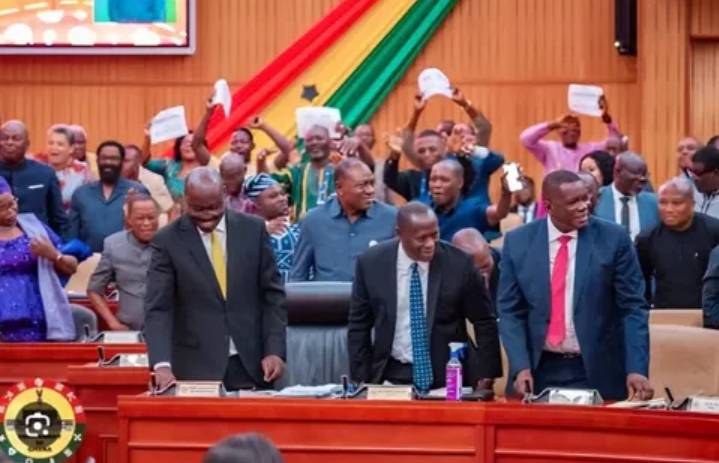Separation Powers Between NPP and NDC: A Comparative Perspective on Ghana's Political Dynamics
The principle of the separation of powers is a cornerstone of democratic governance, ensuring that the different branches of government – the executive, legislative, and judiciary – remain independent and serve as checks and balances on each other. In Ghana, the political landscape is predominantly shaped by two major political parties: the New Patriotic Party (NPP) and the National Democratic Congress (NDC). While the doctrine of separation of powers applies equally under any government, the approach and style of governance between the NPP and the NDC often reflect distinct ideological and strategic differences.
Overview of the Separation of Powers in Ghana
Ghana’s constitution, adopted in 1992, establishes the framework for separation of powers. The executive, headed by the president, is responsible for implementing laws and running the administration of the country. The legislative branch, the Parliament, is tasked with creating laws, and the judiciary interprets these laws and ensures justice is served. The constitution also enshrines checks and balances among these branches, aiming to prevent the concentration of power and maintain democratic governance.
The NPP and the NDC have each had multiple terms in power since the beginning of the Fourth Republic, providing ample opportunity to observe how both parties handle the balance of power among the branches of government.
### NPP’s Approach to Separation of Powers
The New Patriotic Party (NPP), which traditionally aligns itself with a center-right political ideology, tends to emphasize liberal economic policies, decentralization, and institutional reforms aimed at strengthening democracy. When in power, the NPP generally promotes policies that emphasize private sector development and a reduction in state interference, which extends to its governance style.
**1. Legislative-Executive Relations:**
Under NPP governments, there has often been a strong collaboration between the executive and the legislative branches, especially when the party enjoys a majority in Parliament. However, the party has also been vocal about reforms to strengthen the independence of the legislature, including calls for a more autonomous Parliament capable of exerting oversight over the executive.
**2. Decentralization and Local Governance:**
The NPP has traditionally advocated for a more decentralized governance structure, which they believe strengthens local governments and brings decision-making closer to the people. This decentralization aligns with their broader vision of reducing the concentration of power in the executive and promoting a more balanced system of governance.
**3. Judicial Independence:**
NPP administrations have generally respected the independence of the judiciary. Although there have been instances of tension between the executive and judiciary, particularly over high-profile legal cases, the party’s leadership has mostly upheld the judiciary's role as an independent arbiter.
NDC’s Approach to Separation of Powers
The National Democratic Congress (NDC), typically associated with center-left ideologies, often emphasizes social welfare policies, state intervention in the economy, and the central role of the state in driving development. This perspective tends to influence how the NDC views the balance of power across the branches of government.
**1. Executive Dominance:**
During periods of NDC rule, there has sometimes been a perception of executive dominance over the other branches, especially Parliament. The party’s approach has often been to centralize decision-making within the executive, reflecting its belief in the importance of a strong central government to guide national development.
**2. Legislative Relations:**
Like the NPP, the NDC has leveraged its parliamentary majority during its tenures to pass key legislation and support the executive's agenda. However, NDC-led governments have been criticized in some quarters for not doing enough to empower the legislature to act independently, with Parliament sometimes seen as a rubber stamp for the executive’s policies.
**3. Judiciary and the Rule of Law:**
While the NDC has also maintained respect for judicial independence, there have been instances of friction between the executive and judiciary, particularly over contentious rulings that have gone against the government. Despite these tensions, the NDC has historically worked within the constitutional framework and upheld court decisions, though sometimes after public debates over the role and power of the judiciary.
### Differences and Similarities
While both the NPP and NDC operate within the same constitutional framework, their respective governance philosophies influence how they handle the separation of powers:
- **NPP’s focus on decentralization** is a distinguishing feature, with a clear preference for reducing central government control and promoting local governance. The NDC, on the other hand, tends to favor a more centralized approach, reflecting its emphasis on state-led development.
- **Legislative engagement** under the NPP has been more reform-oriented, pushing for a stronger legislative branch, whereas the NDC’s approach has been more pragmatic, often using its legislative majority to support executive decisions without necessarily pushing for structural reforms.
- **Judicial independence** remains a priority for both parties, though tensions have emerged from time to time. Both the NPP and NDC respect the role of the judiciary, but how they react to rulings that go against their government can differ in tone and approach.
Conclusion
The separation of powers remains a vital part of Ghana’s democratic system, regardless of which party holds power. Both the NPP and NDC have their unique approaches to governance, which influence how they interact with the different branches of government. While the NPP tends to emphasize decentralization and institutional reform, the NDC has historically favored a stronger central government with a focus on state-led development. In practice, both parties face similar challenges in maintaining a balance of power, and their governance styles have evolved over time in response to the demands of their respective terms in office. Nonetheless, the framework of separation of powers continues to be crucial in safeguarding Ghana’s democracy.




No comments yet
Be the first to share your thoughts!